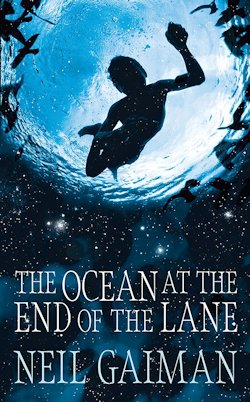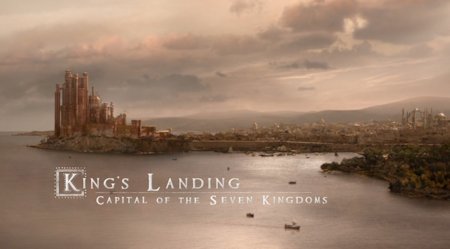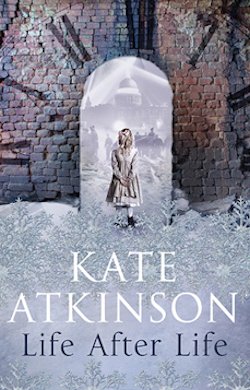Welcome back to the British Genre Fiction Focus, Tor.com’s regular round-up of book news from the United Kingdom’s thriving speculative fiction industry.
Well, 2014 is here, but you wouldn’t know it from the big news this week—it’s all been about 2013! The Guardian released a list of the year’s bestselling books, and the winners of two major awards have been announced since we last did this thing. Congrats are in order to Neil Gaiman and Kate Atkinson for making genre fiction appealing to the mainstream.
Last but not least in this slightly reconfigured edition of the British Genre Fiction Focus, we’ve had a whole year to find our feet, but it simply wouldn’t do to get too comfortable, so expect a few changes in the form of the Focus in the future. Which is to say links, largely.
2013 in Print
From data supplied by Nielsen Bookscan, The Guardian has put together a chart of the hundred bestselling books published—in print, that is—in the UK in the year 2013. The list is led by former Manchester United manager Alex Ferguson’s autobiography, which says so much about the British public that I don’t even want to discuss it…
I was, however, pleased as punch to see some speculative fiction figure into the thing, including Raising Steam by Terry Pratchett, Suzanne Collins’ Hunger Games trilogy—which sold through nearly 400,000 units across all three volumes—and The Hobbit, obviously.
But with almost 200,000 physical copies shifted, A Game of Thrones by that man among men Mr George R. R. Martin was far and away the bestselling bit of speculative fiction last year in the UK. Part the first of the paperback of A Storm of Swords also made the list, in 69th position. How perfectly saucy!

Outliers of particular interest included Inferno by Dan Brown at number 2, which more than 600,000 people purchased, and The Casual Vacancy by J. K. Rowling, which sold 273,000 units—more than twice The Cuckoo’s Calling’s 112,000.
The Guardian also released an opinion piece about the trends evidenced by the aforementioned figures, in which John Dugdale moots that 2013 was a year in which women near-as-damn-it disappeared, and Americans abandoned us Brits to our own madness:
Two female newcomers dominated the all?year bestsellers list at this point last year. EL James (Fifty Shades of Grey) and Suzanne Collins (The Hunger Games)—who had both produced trilogies—took up most of the top 10 slots between them. In 2013, the picture […] is at once more blokeish and more familiar: the shock of the new has given way to the comfort of the old, or at any rate the recognisable. Things also look a bit less American.
Dugdale also discussed the evident death of or disinterest in dystopia. Bear with him here:
Another cycle may also be coming to an end in fiction for children and young adults, which takes up a quarter of the chart. And the gone girls phenomenon is noticeable here too, although it’s more a case of thinning out than of vanishing. Musty paperbacks of Collins’s Hunger Games trilogy, originally from 2008-10, still hang on thanks to the movie adaptations (61, 68, 72); but they’re well behind the bulk of the entries from Jeff Kinney and Walliams, who have five top 100 titles apiece.
Kinney’s eighth Wimpy Kid tale, published in early November, easily overtook books on sale for much longer, soaring to No 5 in the chart after the Kid had surreally battled Alex Ferguson for top spot in the weekly bestseller lists. What links Kinney’s fiction and Walliams’—and John Green’s controversial “sick lit” novel, The Fault in Our Stars (17)—is that their teen and tween protagonists inhabit realistic, ordinary, contemporary worlds, in marked contrast to the fantasy or dystopian novels of Collins, Rowling and Stephenie (Twilight) Meyer that have dominated children’s/YA writing and the top slots in bestseller lists alike for the past 15 years.
Realism also lorded it over fantasy in adult fiction, though here women fared better. Two thrillers came close to taking the No 1 spot, but ultimately even Dan Brown’s indomitable hero Robert Langdon proved no match for Fergie. That Inferno (2) was the year’s bestselling novel was predictable, but the stamina of Gillian Flynn’s third book (3)—the only top-five title not first published in 2013—took many by surprise. A word-of-mouth hit last year, this time it faced challenges from faux-Flynn offerings imitating its plot, title or cover; nevertheless it ruled the beaches for a second summer, as it turned out the “new Gone Girl” was Gone Girl.
The Bookseller took a different tack as regards the data supplied by Nielsen Bookscan. It noted that the total value of the printed book market in 2013 was at approximately £1.4 billion nearly £100 million less than in 2012: the cost of the continuing shift to digital.
Terrifying, to be sure, until you tell yourself that the chances are the value of the e-book market has risen at least £100 million in the same period.
2013 in Prizes

Over the holidays there was some good news for genre fiction in 2013, too. In December, Neil Gaiman’s latest—and some might say greatest—was honoured not once, but twice. The National Book Awards named The Ocean at the End of the Lane the year’s Best Audiobook, before a public vote declared it the Best Book of 2013, period: a prize previously pinched by E. L. James for Fifty Shades of Grey.
Here’s some of what the fan-favourite author said to the BBC about the Specsavers-sponsored honour:
“I’ve never written a book before that was so close to my own heart—a story about memory and magic and the fear and danger of being a child.
“I wasn’t sure that anyone else would like it.
“I’m amazed and thrilled that so many other people have read it, loved it, and made their friends read it too.
“Winning a National Book Award was thrilling; discovering that the public have made The Ocean at the End of the Lane their Book of the Year is somewhere out beyond wonderful. Thank you to everyone who voted.”
And just before we went to press, news of what must mean a new lease of life for Life After Life came by way of The Bookseller:
Kate Atkinson, Lucy Hughes-Hallett, Michael Symmons Roberts, Chris Riddell and Nathan Filer have won prizes at this year’s Costa awards.
Atkinson’s Life After Life (Doubleday) scooped the Costa Novel Award. The judges described Atkinson’s latest novel—which also won the writer UK Author of the Year at the 2013 Specsavers National Book Awards in December—as “astonishing”, saying: “This book does everything you could ask for in a work of fiction and so much more.”
The win gives Atkinson a second opportunity to win the Costa Book of the Year award, following her victory in 1995 with debut novel Behind the Scenes at the Museum when Whitbread was the prize’s sponsor.
So: 2013. A good year for genre fiction, or a bad year? It’s unclear.
Tell you what, though: I quite liked it.
Now to complete the week with loads of links in…
Loads of Links (Title Not Final)

- The Radio Times is reporting that the English village of Kings Langley will change its name for a week in February—to King’s Landing, of course—as part of a push to promote the release of the latest Game of Thrones DVDs
- Hot on the heels of Quercus’ announcement that they would publish a new Millennium book by Swedish author David Lagercrantz in August 2015, Christopher Maclehose spoke to The Bookseller about the Lisbeth Salander brand, and hinted at subsequent sequels.
- According to his latest blog post after a painfully protracted absence, Neil Gaiman is currently working on a “book of retellings of myths.”
- Though they will continue to stock them in stores, Sainsbury’s are to cease selling physical books online because they believe future opportunities lie largely in digital products.
- The lawyer who outed J. K. Rowling as the actual author of The Cuckoo’s Calling has been fined £1000 for breach of confidentiality in addition to the “substantial undisclosed damages” his firm was bade donate to the Soldiers Charity.
- Relatedly, J. K. Rowling is to co-produce and collaborate on the story of a forthcoming stage play exploring “the previously untold story of Harry Potter’s early years as an orphan and outcast”
- HarperCollins imprint Blue Door is to close in 2014 with the planned retirement of publisher Patrick Janson-Smith.
- And there’s more bad news for the UK arm of HarperCollins: it’s seen a 66% drop in profits for the year ending June 30th 2013 after “costs incurred by a change in […] distribution system.”
- Meanwhile, Damien Walter has shared a few notes on the sci-fi we’ll be reading in 2014.
- Anne Perry presents “a reasonably comprehensive list of the SFF titles that Hodder and its sisters Mulholland and Sceptre will be publishing in 2014.”
- Last but not least, The Guardian has a larger look at the year ahead in books. Looking good!
Niall Alexander is an extra-curricular English teacher who reads and writes about all things weird and wonderful for The Speculative Scotsman, Strange Horizons, and Tor.com. He’s been known to tweet, twoo.










